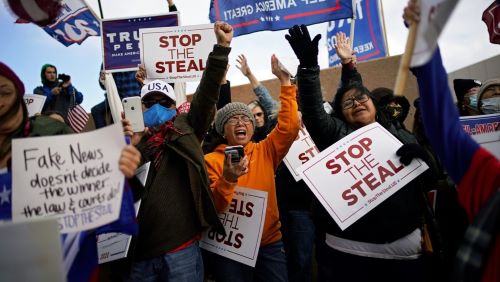

Election officials, civic groups, and the media must act against the threat of election misinformation.
The problem of election misinformation is vast. Part of the problem occurs when there is high demand for information about a topic, but the supply of accurate and reliable information is inadequate to meet that demand. The resulting information gap creates opportunities for misinformation to emerge and spread.
One major election information gap developed in 2020, when the Covid-19 pandemic drove many states to expand access to voting by mail. Inadequate public knowledge about the process left room for disinformation mongers to spread false claims that mail voting would lead to widespread fraud. Election officials — managing unprecedented challenges to ensure what federal authorities ultimately called “the most secure election in American history” — could not fill information gaps with accurate information in time. As is now well known, no less than former President Trump promoted these false claims, among others, to deny the 2020 presidential election results and provoke the January 6, 2021, attack on the U.S. Capitol.
In 2022, false narratives about a stolen 2020 election persist, even as an unprecedented spate of restrictive voting law changes across the country has created fresh information gaps and, thus, fresh opportunities for misinformation. Since 2020, at least 18 states have shrunk voting access, often in ways that dramatically alter procedures voters might remember from the past. Meanwhile, lies and vitriol about the 2020 election have affected perceptions of election administration in ways that complicate work to defend against misinformation.
This paper identifies some of the most significant information gaps around elections in 2022 and new developments in elections oversight that will make it harder to guard against misinformation. Ultimately, it recommends strategies that election officials, journalists, social media companies, civic groups, and individuals can and should use to prevent misinformation from filling gaps in public knowledge. Lessons from other subjects, such as Covid-19 vaccine ingredients and technologies, show how timely responses and proactive “prebunking” with accurate information help to mitigate misinformation.
The consequences of ignoring the misinformation risk posed by these information gaps could be severe. Already, voter trust in elections has plunged since 2020. Threats to election officials have become a serious public safety problem, with 60 percent of election officials reporting in a recent Brennan Center survey concerns that threats, harassment, and intimidation will thin their ranks. After major changes to voting procedures since 2020, at least one state — Texas — has already seen remarkable increases in mail ballot rejections, and several other states have newly disenfranchised some minority voters.
081022-50-PoliticsKey Findings
- Since the beginning of 2021, many states have enacted an unprecedented wave of laws that restrict voting access. At least 18 states, including congressional battlegrounds, passed 34 restrictive laws that could create significant information gaps for voters and result in misinformation. Among them are laws that make it harder to vote by mail, shrink drop box numbers, impose draconian voter ID requirements, punish election workers for routine conduct, empower partisan poll watchers, and eliminate Election Day voter registration. Several states enacted expansive laws, which could also cause confusion and thus risk misinformation. But restrictive changes carry the added risk that voters will mistakenly believe they address real problems of election integrity, confirming or creating false assumptions about widespread voter fraud, for instance, and feeding a disinformation feedback loop around the Big Lie. And many new restrictions impose complex new requirements, which bad actors or confused citizens could misstate in ways that deter voters. Some new laws may also increase voter confusion and misinformation by reducing election staff, delaying results, emboldening partisan poll watchers — thousands of whom conservative organizations have recruited in an unprecedented push to prepare to challenge election results — or creating other unusual conditions.
- New citizens and new voters — who are disproportionately Latino — face special risks in encountering misinformation stemming from information gaps. Information gaps can specially affect new voters and newly naturalized citizens because they lack familiarity with U.S. voting procedures. Newly registered voters are most likely to be Latino. At the same time, election misinformation and disinformation targeting Spanish-speaking and Latino communities is particularly virulent. These new voters may face greater difficulties in recognizing misinformation resulting from information gaps around recent voting law changes.
- Election denialism in 2022 makes it harder to defend against misinformation resulting from information gaps. Baseless denials of the 2020 election results often include attacks on the election process itself, making the task of providing voters accurate information more urgent but also more challenging. Threats and harassment have driven striking numbers of election officials from their posts since 2020. A recent Brennan Center poll found one in five local election officials say they are likely to resign before the 2024 presidential election. These departures would drain administrative expertise from the field. Meanwhile, election denialism has infected races for offices with power over elections, with dozens of candidates across at least 18 states embracing false claims of a stolen 2020 presidential election. Their messages encourage people to make sinister assumptions about unfamiliar voting procedures.
- Texas and Los Angeles County, California, provide contrasting examples of how to address the significant information gaps facing voters. Texas voters received too little accurate information on major changes to mail voting ahead of the state’s 2022 primary election, after a new law constrained election officials’ ability to conduct public outreach. In the primary, mail ballot rejection rates in Texas skyrocketed compared to past years, up more than 1,100 percent from the 2020 presidential election. By contrast, ahead of California’s procedurally unusual 2021 gubernatorial recall election, Los Angeles election officials proactively educated voters on topics of confusion and prepared to prevent and mitigate misinformation in real time. The election unfolded with remarkably little controversy.
Key Recommendations
Recommendations for election officials
- Plan well-timed voter education campaigns that include resources such as Frequently Asked Questions pages and video tutorials.
- Provide educational resources in voters’ preferred languages.
- Consider publishing rumor control pages to “prebunk” misinformation.
- Build and maintain a network of partners and messengers — including secretaries of state, community groups, candidates of all affiliations, business groups, and the media — to amplify accurate election information.
- Where languages other than English are common, election officials should seek partnerships with messengers who can reach such voters and have their trust.
Recommendations for community-based organizations
- Develop contacts among election officials and nonpartisan voting experts.
- Provide accurate election information and tools to identify misinformation to community constituencies in preferred languages and formats.
- Develop partnerships with trusted messengers to ensure community education efforts travel further.
Recommendations for journalists
- Cultivate authoritative sources on elections, including election officials.
- Report pre-election stories on confusing or new topics.
- Provide accurate context and perspective in covering commonplace glitches or delays, consulting with nonpartisan experts where needed to help prevent misinformation.
Recommendations for internet and social media companies
- Publish and amplify accurate, authoritative election information.
- Publish clear and transparent policies to minimize election misinformation.
- Create infrastructure to impede election misinformation, such as effective education tools and algorithmic interventions that slow the spread of misinformation.
- Defend election official websites and accounts against hacking and interference.
Recommendations for the public
- Make a plan to vote that accounts for recent changes in voting procedures.
- Learn how to recognize online misinformation and build news literacy.
- Seek out context for troubling election-related claims.
- Share accurate voting information with social, civic, and faith networks.
Originally published by the Brennan Center for Justice, 08.02.2022, under the terms of a Creative Commons Attribution-No Derivs-NonCommercial license.


